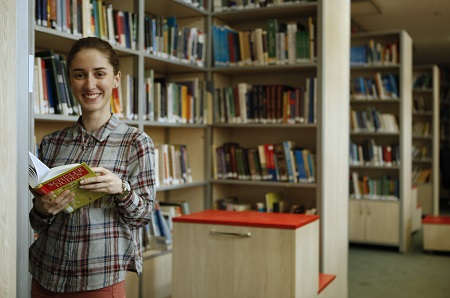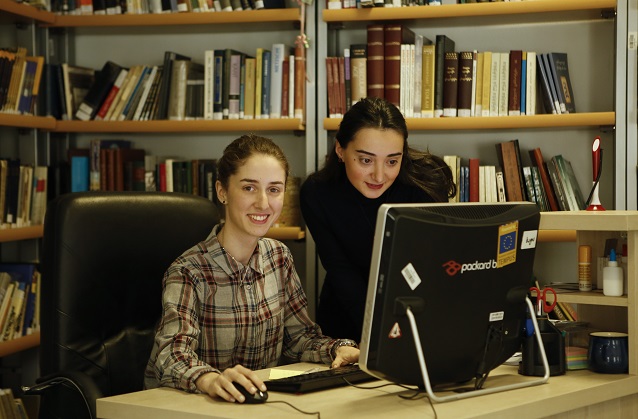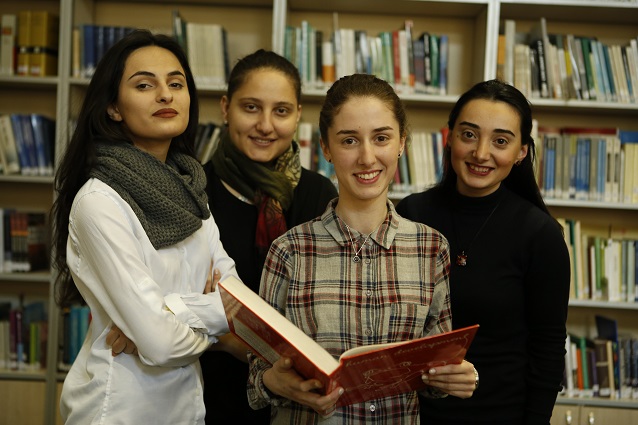“Once Erasmus, always Erasmus”
How education brings Georgia closer to EU


"Studying in Denmark was a life-changing experience: it made me want to become a school teacher back home, where I am determined to implement modern teaching and learning methods” says Tinatin Nakashidze, a 22-year-old Georgian student, who studied at University College UCC in Copenhagen for one semester as part of an Erasmus+ exchange.
Erasmus+ is the European Union programme for education, training, youth and sport. Erasmus, which became Erasmus + in 2014, aims to modernise education, training and youth work and support the mobility of youth. Georgia is eligible for higher education programmes and is becoming more engaged in youth-related programmes (e.g Eastern Partnership Youth Window Programme). There are discussions to include Georgia as an eligible lead, or partner country for programmes related to the European Voluntary Service, youth and sports.
Nakashidze studies psychology at Ilia State University, one of the leading state universities in Georgia, and when she received the Erasmus+ Credit Mobility Scholarship she felt all her dreams had come true. In Denmark, she followed a taught programme on the Nordic Model of Teacher Education.
"Erasmus+ is much broader than studying, it is an opportunity,” Nakashidze said.

The course was very practical, and I was also an English teacher at one of the high schools of Copenhagen. It was a process of self-discovery. I would like to put into practice what I learned during my European experience and teach students with those methodologies, which are very different from the Georgian style of teaching,” she added.
Beka Beriashvili, a 25-year-old alumnus who benefited from a Degree Mobility scholarship for Erasmus Mundus Master Courses, described Erasmus+ as "a life experience". He studied Marketing Analysis and Strategy at the University of Alexandru Ioan Cuza of Iasi (UAIC) in Romania.
"We have a saying, 'Once Erasmus, Always Erasmus'. Once you go through it, you become a different person. You have friends from all over the world, you appreciate cultural diversity and different ways of thinking. You understand that it is diversity that makes your life beautiful and that you should try each day in your life to be different,” he said.
Beriashvili now works as a marketing manager at a private company in Tbilisi. He said his European education had had a big impact on his career. "Here, employers value foreign degrees much more than local ones. Studying abroad gave me knowledge in areas I would not get in Georgia. That is an important competitive advantage in the job market,” he added.

With over 2,400 scholarships, Georgia is one of the 10 most popular countries worldwide for short-term Erasmus+ mobility, according to the 2015 and call results. This figure also includes 760 incoming students and academic staff members from Europe, who spend time in Georgia and in so doing, have enriched the Georgian higher education system.
Dr. Lika Glonti, the Coordinator of the National Erasmus+ Office (NEO) Georgia, who assists the European Commission and the local authorities, believes Georgia’s achievements in Erasmus+ are impressive.
"We are very proud of Georgia’s achievements for many reasons. In particular, international departments at local universities work very well and Georgia is a very attractive country for academic mobility. Why attractive? Because Georgia is a safe country, the knowledge of foreign languages is high, and the country is a full member of the Bologna Process/European Higher Education Area,” Glonti added.
Dr. Glonti described the role of the National Erasmus+ Office (NEO) as connecting Georgians with foreigners. She said it was very easy to work in Georgia because of political support for the programme from government and other institutions.
The Georgia NEO offers support to four main schemes: Capacity Building for Higher Education (ex-Tempus), Credit Mobility, Degree Mobility and Jean Monnet.
There are currently 75 state-recognised Higher Education Institutions in Georgia, and 32 of these collaborate with universities from 30 Erasmus+ programme countries. Ilia State University is the first Georgian Higher Education Institution to coordinate a Capacity Building project in the field of Higher Education (CBHE), while with 30 CBHE projects implemented so far, Ivane Javakhishvili Tbilisi State University is leading not only in Georgia, but in the whole South Caucasus.
The Head of the Foreign Relations Office at Ilia State University, Salome Bilanishvili, herself an alumnus of an Erasmus+ Joint Master Programme, highlighted the importance of the CBHE programme for universities, providing a unique platform for the exchange of best practice in the modernisation of higher education systems between the European Union and the Partner Countries involved in the programme.
In the framework of CBHE, Ilia State University implemented 27 projects and currently we are coordinating the ABC - Assisting Better Communication project, which aims to introduce and enhance the profession of Speech and Language Therapist in the participating countries through the elaboration of quality courses offered at different levels of higher and professional education,” Bilanishvili said.
Dr. Glonti said that since the early days of Tempus, the scope of CBHE projects has changed a lot. "In the 1990s, the programme was the only way to buy a computer for the university, while now the added value of it is the networking with colleagues.”
International Erasmus+ students coming to Tbilisi, as well as Georgian students who want to take part in exchange programmes, can benefit from the services of the Erasmus Student Network Tbilisi (ESN), an official section of ESN, a non-profit international student organisation, which provides opportunities for cultural understanding and self-development under the principle of SHS-Students Helping Students.
The main focus of ESN Tbilisi is placed on current exchange students, who often face problems (and feel abandoned) in their new environments. ESN therefore offers help in the academic, social and practical integration process.
"We organise different kinds of activities," explains the President of ESN Tbilisi Tamari Phruidze. "International students have the opportunity to study Georgian for free in our language club. Georgian students teach them our national language as volunteers. Beside this, we organise city tours and trips to different places in Georgia, and we are also planning a cultural festival. In the framework of this event, they will have an opportunity to make presentations about their country and culture, perform national dances or songs and make national dishes too.”
ESN Tbilisi also organises two-day-long trainings for Georgian students who want to take part in exchange programmes, study and visit different countries in Europe. "The aim of these trainings is to help them get the necessary information and also to show them how many advantages they have from just moving in Europe,” Phruidze added. The members of ESN Tbilisi provide their services on a voluntary basis.
Erasmus alumni all agree the programme is a highly beneficial experience, an opportunity to learn from each other and to experience cultural diversity. Beka Beriashvili advised future Erasmus+ students to spend their Erasmus time wisely. "Each minute during Erasmus is an opportunity that should not be wasted.”
This article was produced in the framework of the EU Neighbours East project. The views expressed are solely the ones of the author of the article.
 Tweet
Tweet  Share
Share